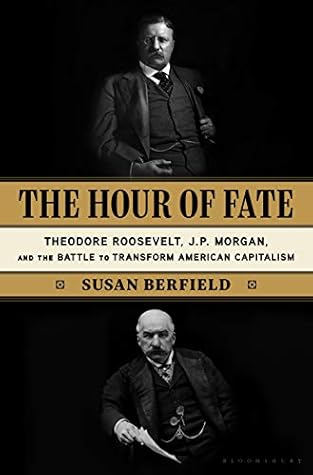More on this book
Kindle Notes & Highlights
Read between
October 26 - November 13, 2021
Politicians from both18 parties were willing to support legislation for a price or threaten regulation to get a corporate payoff. They were part of political machines that exchanged patronage and government assistance for votes on Election Day and traded favors and bribes afterward.
Roosevelt began to peer into the workings of the New York elite, the politicians and judges and businessmen whose common cause was to entrench themselves in power and enrich themselves as a result.
Through the autumn and winter of 1897, newspaper stories of Spain’s brutal rule in Cuba convinced many that America should help the revolutionaries fighting for independence.
“A soft, easy life is not worth living, if it impairs the fiber of brain and heart and muscle,” the candidate said. “We must dare to be great.”
Many were unsettled by the arrival in their cities and towns of migrants from southern and eastern Europe. Anti-immigrant racism gained purchase.
“I do not intend to play a demagogue. On the other hand, I do intend to, so far as in me lies, see that the rich man is held to the same accountability as the poor man, and when the rich man is rich enough to buy unscrupulous advice from very able lawyers, this is not always easy.” The Supreme Court was skeptical of executive power, and Congress uneasy about extending a president’s authority to the world of business. The trusts were a quandary that McKinley was willing to set aside. His populist opponents made it into a cause.
“It really seems hard,” Hill wrote to a friend, “that we should be compelled to fight for our lives against the political adventurers who have never done anything but pose and draw a salary.”
William Craig, Roosevelt’s personal Secret Service agent, perched next to the driver.
Craig was the first Secret Service agent to be killed on duty.
The senator from Massachusetts told the president that Republicans in his state were advocating for nationalization of the mines.
One morning, the president mentioned his scheme to a leading Republican politician, James Watson. The representative was alarmed: “What about the48 Constitution of the United States? What about seizing private property for public purposes without due process?” Roosevelt took hold of Watson’s shoulder and almost shouted: “The Constitution was made for the people and not the people for the Constitution.”
Morgan announced56 that he would buy fifty thousand tons of coal from Wales, transport it on International Mercantile Marine ships, and distribute it for free to New York City’s poor. He would likely spend half a million dollars. It was an unsubtle reminder to the coal executives that he was losing patience.
the appearance of compromise could be more powerful than compromise itself.
Apparently some frustrated businessmen, “the Big Interests,”20 a friend called them, hired psychologists to analyze Roosevelt’s public statements and actions, looking for evidence that he was too unbalanced to be president.
“In the enforcement3 of the laws [Roosevelt] has shown not only courage, but the wisdom which understands that to permit laws to be violated or disregarded opens the door to anarchy, while the just enforcement of the law is the soundest conservatism.”
Concentrated wealth, often the result of corporate domination, causes the kind of economic inequality that can undermine powerful societies. It challenges the notion of democracy; politics seems rigged in favor of the rich and influential. It can leave people feeling helpless and desperate. Roosevelt said making change could be dangerous but doing nothing could be fatal.


